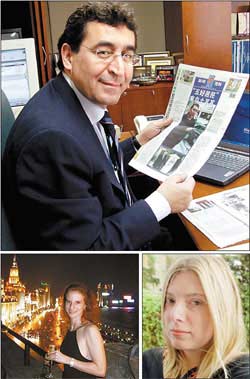| Home / Living in China / Expat Tales | Tools: Save | Print | E-mail | Most Read |
| Great Haul of China |
| Adjust font size: |
They are here for a good time -- and a long time. When months stretch into years and life becomes a string of farewell parties for friends returning home, there comes a time in an expatriate's life when they must ask: have I gone native? Foreigners in Carol Wolfson has lived here for 26 years yet still refuses to call herself an Old China Hand. The American was one of the first three foreign students to be offered an exchange scholarship to
Many expats have witnessed social change in China and established a true affinity for its culture and people. Pictured above are three of these Old China Hands: Noyan Rona from Turkey (top), Carol Wolfson (left) and Natalie Behring (right) from the US. She stayed on illegally, working at "I wasn't particularly talented or incredibly brilliant, but I was one of the few young professionals who spoke Chinese at the time, so it truly was luck and opportunity that led me to live in "After working and living in Wryly recalling the first days of Coca Cola and Snickers in "When I first moved here, my boyfriend had to bring me necessities such as pantyhose, shampoo and cheese from She has watched the world grow smaller, and today finds herself searching for former haunts that no longer exist. "Nowadays, Noyan Rona is another who has witnessed first-hand the social changes Today, Rona is chief representative of the Turkey Garanti Bank in China, and one of a small group of foreigners with a position on the political advisory body of Changning District's annual Chinese People's Political Consultative Conference (CPPCC). "No foreigner could have foreseen the changes that "Twenty years ago you may have dreamt of a piece of bread. Nowadays you can find it in almost all neighborhoods." Photojournalist Natalie Behring first came to
Behring studied Mandarin before deciding a backpacking trip around the country would help develop her language skills. It was on this odyssey that she picked up a "real camera" for the first time and decided on a career behind the lens. "A light went on in my head and I knew this was what I wanted to do. I knew that I would love it forever," the 35-year-old says. Behring was hired by the The past decade has seen the international freelancer cover major stories across Asia, the Middle East and "There's endless possibilities here, for news and also for shooting great features," said Behring, whose work is regularly published in leading world newspapers and magazines, including the New York Times, The Globe and Mail, and Newsweek. "Chinese news on an international scale is worthy of a front page every week." Author Tess Johnston has staked her claim for the title of oldest expatriate resident. She came to "Having passed 75 years of age, I am probably the oldest living expat in "At that time my co-author and photographer Deke Erh and I had completed five volumes on Western architecture in old What makes a foreigner suited to living long-term in The husband-and-wife team, who have straddled two cultures since the early 1990s, believe going the distance, "takes an incredible amount of flexibility and fortitude". "One recent figure put the percentage of expats returning home early as high as 70 percent. These are people who come to The pair moved to "We found that life is actually easier in By Ida Relsted and Viva Goldner ( |
| Tools: Save | Print | E-mail | Most Read |
 |
| Related Stories |

